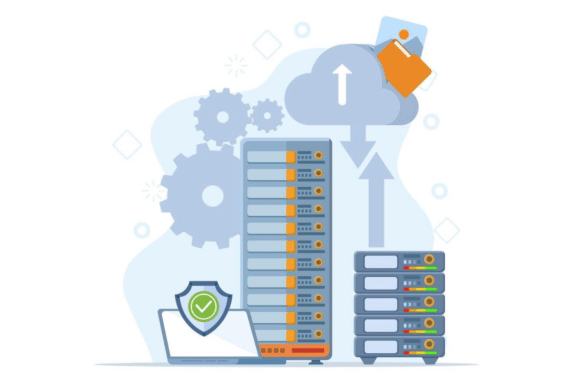File Cloud Server – In the ever-evolving world of digital transformation, businesses and individuals increasingly rely on cloud-based solutions to store and manage their data. Among the various cloud services available, file cloud servers have gained immense popularity due to their ability to store, manage, and access files remotely, securely, and efficiently. Whether it’s for personal use or enterprise-level storage solutions, file cloud servers offer unparalleled benefits in terms of scalability, flexibility, and accessibility.
A file cloud server is a cloud storage service that allows users to store files on remote servers managed by a cloud provider. These servers are accessible via the Internet, enabling users to access their files from anywhere, anytime, as long as they have an Internet connection. Instead of storing files on a local hard drive or a physical server, users can store and share data in a centralized cloud system, which the cloud service provider often manages and maintains.
In this article, we will explore the key features of a file cloud server, how it works, its benefits, and why businesses and individuals are adopting this storage solution to streamline their operations and safeguard their data.

What is a File Cloud Server?
A file cloud server is an online storage solution that allows individuals or organizations to store and access their files and data over the internet. Unlike traditional file storage methods, such as saving files on a local hard drive or a physical server, a cloud file server hosts files in a remote data center. This data can be accessed and managed using various devices such as smartphones, tablets, laptops, or desktop computers.
Cloud providers like Google Drive, Dropbox, OneDrive, and Amazon Web Services (AWS) offer file cloud server solutions that cater to both individual and business needs. These providers offer file synchronization, sharing, backup, and collaboration tools, which enhance the accessibility and productivity of cloud-based file management systems.
At its core, a file cloud server enables users to upload their files to a remote server managed by the cloud provider. The data is stored on multiple redundant systems, ensuring it is safe and accessible, even if one server fails. Most cloud file servers also employ encryption methods, both during data transfer and while stored, to protect sensitive files from unauthorized access.
How Does a File Cloud Server Work?
A file cloud server operates through several key components that ensure efficient and secure file storage, management, and retrieval. Here’s how it typically works:
- Uploading Files to the Cloud
Users upload files from their local devices to the cloud server via the cloud provider’s platform (e.g., through a web browser, desktop application, or mobile app). Once uploaded, the files are stored on remote servers, and the data is backed up and protected using the provider’s security protocols.
- Data Replication and Redundancy
File cloud servers use data replication to ensure that files are stored across multiple servers in various locations. This is important for disaster recovery and ensures that files remain accessible even if one server or data center experiences an issue.
- File Synchronization
One of the primary features of a file cloud server is its ability to synchronize files across multiple devices. When a user uploads a file to the cloud, it can be accessed from various devices, and any changes made to the file (such as edits, deletions, or additions) are automatically synced across all devices. This ensures that users always have the most up-to-date version of their files, regardless of where they access them.
- Accessing Files
Once files are stored on the cloud, users can access them remotely from any device with an internet connection. File cloud servers provide easy access through a web interface, desktop software, or mobile apps. Users can view, download, upload, and share files as needed.
- Security Measures
Security is one of the most critical aspects of a file cloud server. Cloud providers employ several layers of protection to ensure the safety and privacy of files, such as:
- Data encryption: Ensuring that files are encrypted in transit and at rest.
- Multi-factor authentication (MFA): Requiring users to provide two or more verification factors to access files.
- Access control: Allows users to set permissions for those who can view, edit, or share their files.
Key Benefits of File Cloud Servers
File cloud servers offer a wide range of benefits for both businesses and individuals. From enhanced collaboration to robust data security, these systems provide a comprehensive solution for modern data management. Below are the key advantages of using a file cloud server:
- Access Anytime, Anywhere
One of the most significant advantages of a file cloud server is the ability to access files from any location at any time. Whether yorking from the office, traveling, or at home, you can securely access your files from any device connected to the internet. This flexibility improves productivity, as users can collaborate on projects, make updates, and retrieve files without being tied to a specific location.
- Scalability
File cloud servers are highly scalable, meaning businesses can quickly increase or decrease their storage capacity. This flexibility eliminates the need for companies to invest in physical storage devices or server infrastructure. Cloud providers often offer different pricing tiers based on storage needs, so businesses can choose the plan that best suits their current requirements and scale up or down as needed.
- Cost-Effectiveness
Using a file cloud server can significantly reduce costs for businesses. Traditional data storage solutions often require significant investments in physical hardware, ongoing maintenance, and IT staff to manage the infrastructure. In contrast, cloud-based file servers operate on a pay-as-you-go model, meaning businesses only pay for the storage they use. This reduces the need for large capital expenditures and allows companies to optimize their IT budgets.
- Data Backup and Disaster Recovery
Cloud file servers offer automatic backup and disaster recovery features. Files are regularly backed up, ensuring that if a disaster occurs (such as a server failure, fire, or data corruption), data can be quickly restored to its last known good state. This feature is particularly valuable for businesses, as it minimizes downtime and reduces the risk of data loss.
- Collaboration and File Sharing
Cloud file servers enable users to collaborate seamlessly by allowing multiple people to access, edit, and share files in real time. Many cloud file servers have built-in collaboration tools such as document editing, version control, and commenting features. This makes them an ideal solution for businesses, teams, or groups working on shared projects. Furthermore, users can set permissions and access controls to ensure only authorized individuals can view or edit specific files.
- Enhanced Security
File cloud servers provide enhanced security compared to traditional local storage. Files are often encrypted, and access to the server is protected by multi-factor authentication and access control policies. Cloud providers implement robust security measures, such as firewalls, anti-malware protection, and regular security audits, to keep data safe from cyber threats. These security features are essential for businesses handling sensitive data or operating in highly regulated industries.
- Reduced IT Management
With cloud file servers, businesses can offload the storage infrastructure management to the cloud provider. This means organizations don’t need to invest in hardware or maintain physical servers, reducing the burden on their IT teams. Cloud providers manage the underlying infrastructure, security, and software updates, allowing businesses to focus on their core operations.
Use Cases for File Cloud Servers
The versatility of file cloud servers makes them suitable for various applications across various industries. Here are some everyday use cases:
- Business File Storage and Backup
Organizations of all sizes use cloud file servers for secure, centralized storage. By storing essential documents and data in the cloud, businesses can ensure their information is easily accessible, properly backed up, and protected from data loss.
- Remote Workforce Support
With more people working remotely, cloud file servers have become an essential tool for ensuring that remote workers have access to company files and resources. Cloud file servers allow employees to work from anywhere, collaborate seamlessly with colleagues, and access up-to-date information without being tied to the office.
- Collaboration and Document Sharing
Teams working on joint projects or documents benefit from using a cloud file server. These servers make file sharing and collaboration easy, enabling team members to edit documents in real time, leave feedback, and track changes.
- Media and Content Storage
Creative professionals, such as photographers, videographers, and designers, often store large media files with cloud file servers. Cloud servers provide ample storage space, fast file uploads, and efficient file retrieval, making them ideal for managing content-heavy projects.
Conclusion
A file cloud server is invaluable for businesses and individuals looking to streamline their data storage, management, and collaboration processes. File cloud servers offer unparalleled flexibility and convenience by providing scalable, secure, and cost-effective solutions. Whether for personal file storage or enterprise-level data management, cloud file servers enhance productivity, ensure data security, and facilitate seamless collaboration.
As more organizations move their operations to the cloud, file cloud servers will play a critical role in the digital transformation journey. With the ongoing advancements in cloud technologies, businesses, and individuals can expect even greater efficiency and security in managing their digital assets in the cloud.

